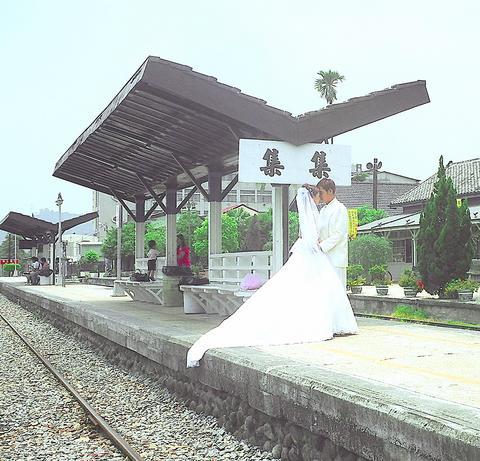Mention the name Chichi to any native of Taiwan and a smile will likely come to their face. It may be because you've pronounced it incorrectly and sounded like a child referring to male genitalia, but more likely because they're familiar with one of Nantou County's most tourist-trodden townships -- and a favorite destination for young couples.
The reason for the town's popularity is likely because it is the namesake station of the Chichi Small Rail Line (集集小火車線), which, along with Neiwan (內灣) and Pinghsi (平溪), make up the full complement Taiwan's narrow-gauge rail lines. The lines became famous by transporting tourists to Taiwan's mountainous interior via steam locomotives and, in Chichi's case, the terminal station sits just beneath Sun-Moon Lake (日月澤), making it an especially popular destination.
The iron horses were long ago put out to pasture but still dutifully serve as photo fodder at many of the stations on each small line, including Chichi, which also boasts a pair of tanks where couples can straddle the gun turret and flash peace signs. Even the station itself, destroyed in the 921 earthquake, has been rebuilt to Disneyland standards and is the preferred hangout for local teens and college groups on weekend escapes.

PHOTO: DAVID MOMPHARD, TAIPEI TIMES
Chichi's residents and the Nantou County government realize their role as a tourist destination and much of the money spent rebuilding the area has been used to polish this image; retro-styled street lamps that light the town, roadside pavilions for cyclists, and a marked increase in the number of cafes and tandem-bicycle rental shops.
For all the money the government has spent embellishing the town, though, one of the first things tourists do when arriving is leave town for the several-kilometer stretch of road that laces around the railroad. The "green tunnel" (錄色邃道), as it's called, is a verdant canopy of trees covering the road between Chichi and Lungyuan. The road runs through a bamboo forest with little to no development and several thousand strands of Christmas-tree lights were added last year, turning the green tunnel into a candle-light cruise on weekend nights. Cycling beneath the lights in the early evening gives credence to the area's claim to be a capital of romance.
"There is also a special animal protection area (特有生物保育中心), an arts district and Wuchang temple (武昌宮) -- or actually Wuchang temple's roof," said cycle shop owner Pan Yu-chu (潘玉珠) when asked of the area's highlights. The roof is the only part remaining after the 921 quake, Pan said, and claims that more weekenders have inquired how to get to it since it toppled than ever did when it was standing.
Pan also said that business has dropped by some 30 percent since fear of SARS has gripped the nation, but she's not complaining. "I think as long as young people fall in love, Chichi will always have tourists," she said.

June 9 to June 15 A photo of two men riding trendy high-wheel Penny-Farthing bicycles past a Qing Dynasty gate aptly captures the essence of Taipei in 1897 — a newly colonized city on the cusp of great change. The Japanese began making significant modifications to the cityscape in 1899, tearing down Qing-era structures, widening boulevards and installing Western-style infrastructure and buildings. The photographer, Minosuke Imamura, only spent a year in Taiwan as a cartographer for the governor-general’s office, but he left behind a treasure trove of 130 images showing life at the onset of Japanese rule, spanning July 1897 to

One of the most important gripes that Taiwanese have about the Democratic Progressive Party (DPP) is that it has failed to deliver concretely on higher wages, housing prices and other bread-and-butter issues. The parallel complaint is that the DPP cares only about glamor issues, such as removing markers of Chinese Nationalist Party (KMT) colonialism by renaming them, or what the KMT codes as “de-Sinification.” Once again, as a critical election looms, the DPP is presenting evidence for that charge. The KMT was quick to jump on the recent proposal of the Ministry of the Interior (MOI) to rename roads that symbolize

On the evening of June 1, Control Yuan Secretary-General Lee Chun-yi (李俊俋) apologized and resigned in disgrace. His crime was instructing his driver to use a Control Yuan vehicle to transport his dog to a pet grooming salon. The Control Yuan is the government branch that investigates, audits and impeaches government officials for, among other things, misuse of government funds, so his misuse of a government vehicle was highly inappropriate. If this story were told to anyone living in the golden era of swaggering gangsters, flashy nouveau riche businessmen, and corrupt “black gold” politics of the 1980s and 1990s, they would have laughed.

It was just before 6am on a sunny November morning and I could hardly contain my excitement as I arrived at the wharf where I would catch the boat to one of Penghu’s most difficult-to-access islands, a trip that had been on my list for nearly a decade. Little did I know, my dream would soon be crushed. Unsure about which boat was heading to Huayu (花嶼), I found someone who appeared to be a local and asked if this was the right place to wait. “Oh, the boat to Huayu’s been canceled today,” she told me. I couldn’t believe my ears. Surely,